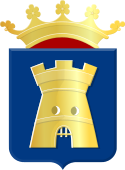Boskoop (Netherlands)
 flag |
 coat of arms |
| province |
|
| local community |
|
|
Area - land - water |
16.95 km 2 14.88 km 2 2.07 km 2 |
| Residents | 15,535 (Jan. 1, 2017) |
| Coordinates | 52 ° 4 ′ N , 4 ° 39 ′ E |
| Important traffic route |
|
| prefix | 0172 |
| Postcodes | 2332, 2391, 2405, 2407, 2409, 2411, 2741-2742, 2771 |
Boskoop ( ) is a village and a former municipality in the Netherlands , province of South Holland , with 15,535 inhabitants (as of January 1, 2017). The community was about 17 km². On January 1, 2014, it merged with the municipalities of Alphen aan den Rijn and Rijnwoude and took over the existing name Alphen aan den Rijn .
Location and economy
Boskoop lies roughly in the middle of a triangle between Leiden , Gouda and Alphen aan den Rijn . It is on the country road and the local railroad between the last two cities.
The main source of income for the place are the tree nurseries and market gardens . All kinds of ornamental and fruit trees, but also roses, are grown. Boskoop has one of the largest concentrations of tree nurseries in all of Europe; the crops are exported to all of Europe.
The famous apple “ Schöner aus Boskoop ” owes its name to the place.
There is also some industry and trade in the village.
Site, sights
The community is characterized by small plots that are separated by numerous narrow moats. The boggy, swampy but very fertile soil is drained in this way. In the past, these ditches were dug out and the sludge released was used as a suitable fertilizer.
In the village there is a small museum dedicated to tree nurseries and their history ( Boomkwekerijmuseum ).
history
The second member of the name Boskoop, in medieval Dutch cope (German: purchase, land acquired by purchase contract) can be explained by the fact that the Count of Holland or the local ruler provided a farmer with a desolate piece of moor for a fee to cultivate it to make: the buyer also became the owner of the land. This term can also be found in other place names in South Holland and Utrecht , such as Nieuwkoop, Heen Boeicop and others.
Boskoop was already known under the name Ten Bussche ( German Zum Busch ) in 1204 . It was given to a monastery by the then Count of Holland in 1222, actually a pen for noble ladies. As in the whole area, Boskoop is in a fen ( laagveen located). Unlike in neighboring towns such as Rijnwoude , the peat was not extracted. First, because the distance to the cities was greater, and so the transport costs were higher, and second, because the fertile soil had been used for growing fruit trees since the village was founded in the 13th century. These nurseries have remained the main source of income for Boskoop to this day. From around 1870 the quality and quantity of the products had increased so that the plants were exported to Germany and other countries.
The municipalities Alphen aan den Rijn , Boskoop and Rijnwoude merged on January 1, 2014. The new municipality has around 106,000 inhabitants and takes over the existing name Alphen aan den Rijn .
politics
Distribution of seats in the municipal council
| Political party | Seats | |||
|---|---|---|---|---|
| 1998 | 2002 | 2006 | 2010 | |
| VVD | 4th | 4th | 3 | 5 |
| CDA | 4th | 6th | 5 | 5 |
| GroenLinks | 2 | 2 | 2 | 2 |
| ChristenUnie / SGP | - | 2 | 3 | 2 |
| D66 | 1 | 1 | 1 | 2 |
| PvdA | 2 | 2 | 3 | 1 |
| SGP / RPF | 2 | - | - | - |
| total | 15th | 17th | 17th | 17th |
Town twinning
| Bruchköbel , Germany since 1984 |
Daughters and sons of the city
- Arie van Houwelingen (* 1931), cyclist
Web links
Individual evidence
- ↑ a b Kerncijfers wijken en buurten 2017 Centraal Bureau voor de Statistiek , accessed on May 20, 2018 (Dutch)
- ↑ Fusie Alphen aan den Rijn met Boskoop en Rijnwoude is round. In: Omroep West. May 16, 2013, accessed May 20, 2018 (Dutch).
- ↑ Het nieuwe woordmerk moved. In: alphens.nl. May 8, 2013, accessed May 20, 2018 (Dutch).
- ↑ Allocation of seats in the municipal council: 1998–2002 2006 2010 , accessed on May 20, 2018 (Dutch)